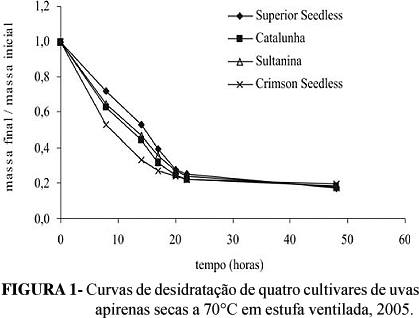The São Francisco river valley region in Brazil stands out as table grape producer with increasing rates in seedless grape production. In order to avoid producer's losses and increase their gain, there is a need for the development of technologies to make some profit from the exceeding yield. Considering the Brazilian dependence on the international market for raisin supply, this work aims to evaluate the raisin production from the seedless cultivars Sultanina, Catalunha, Superior Seedless and Crimson Seedless grown in the north region of Minas Gerais, at the São Francisco river valley. Chemical composition of the raisins such as humidity, total soluble solids (TSS), total titrable acidity (TTA), pH and reducing sugars and longitudinal and transversal diameters were evaluated and compared to the imported raisins bought at a local market. Raisins produced in this region showed bigger size and similar composition than the imported ones. Crimson Seedless raisins showed higher humidity after 20h of dehydration while Catalunha and Sultanina pointed out in TSS, TTA and reducing sugar amounts. Data show that raisin production is technically feasible, although research is necessary to evaluate the process economically.
seedless grapes; dehydration; composition




